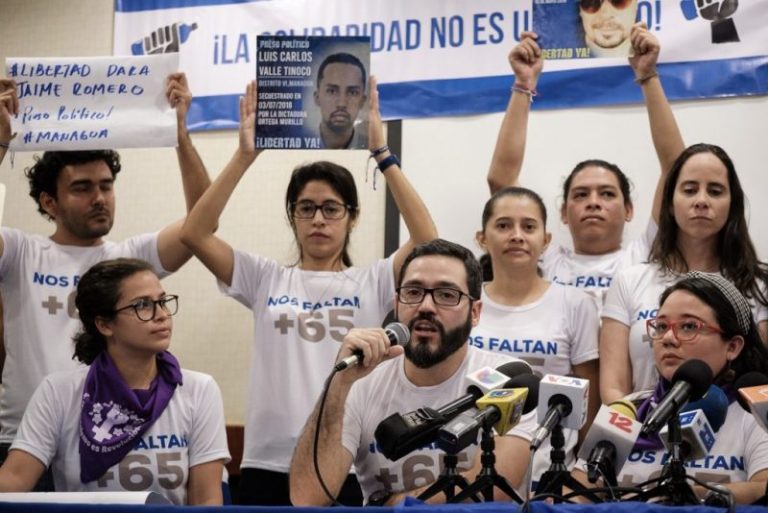13 de octubre 2021

Children of Exile: The Births “Sowing Hope” in the Camp of Nicaraguan Farmers

PUBLICIDAD 1M
PUBLICIDAD 4D
PUBLICIDAD 5D
Jesús Tefel, UNAB member in exile: opposition organizations agree to promote empty the streets on November 7

Organizations of the Nicaraguan Democratic Opposition called to “stay at home” and not participate in the November 7 elections being held in a police state
Organizations of the Nicaraguan Democratic Opposition called to “stay at home” and not participate in the November 7 elections being held in a police state, with imprisoned opposition candidates and their political parties outlawed, explained Jesús Téfel, a member of the Blue and White National Unity (UNAB), one of the organizations that signed the opposition’s statement.
Tefel, who is exiled in Costa Rica, and “Donald,” who requested that his identity be protected for security reasons, appeared on the online Esta Semana program to analyze the opposition position, based on a recent statement signed by 9 organizations outlining a roadmap of the opposition’s strategy. It calls for rejecting the election results, demands the release of political prisoners, and stresses the need for a new electoral process.
“The regime could utilize the turnout at the polls to say that everyone there came to vote for him, and since we have no way to monitor the votes, or be present in the polling places, we would have no way to challenge these assertions. So, we have decided that the best thing to do is stay at home that day, leave the streets empty, and not participate in their game,” said Tefel.
Tefel explained that the signing of the pronouncement, shared by the UNAB, the Farm Movement, the Articulation of Social Groups, The Democratic Renovation Movement (Unamos), the Initiative for Change, the Exile Medical Association, the Nicaraguan Democratic Front, and several diaspora organizations in the United States, Costa Rica and Europe, is a product of political dialogue and not the creation of a new organization or coalition. The goal is for these organizations to have a coherent and common discourse regarding the process of the elections to be held next month, in such a way as to generate pressure on the international level, hopefully creating the conditions necessary for a change in the correlation of forces in Nicaragua.
Donald said that the statement demonstrates that “there are already multiple dialogues among the opposition organizations so that actions can be articulated and focused on common objectives.” He admitted that these are small victories on the road to creating a common front against the dictatorship, considering the repressive atmosphere existing in Nicaragua at the present time.
Tefel recapped that the elections are illegitimate because of several factors, from the approval of electoral reforms that strengthened the governing party’s control over the structure of the Electoral Council, the elimination of the legal status of the Democratic Renovation Party and the Citizens for Liberty, to the arrests of potential opposition candidates and civic leaders in the context of Ortega’s increasing repression.
“We don’t want this to look like we’re saying if you vote you are a traitor to democracy, or anything of the sort. But to the extent that we can, we are saying “let’s stay home” to limit those ballot boxes as much as possible, like the future of Ortega,” clarified Tefel.
The opposition also affirmed that given the situation in Nicaragua, they must increase their public presence to envision the possibility of change, meaning that the leaders in exile can return with guarantees, and the political prisoners be released, things that can only be achieved via pressure on Ortega, noted Tefel.
Donald said it is important for sectors such as the Catholic Church and the private sector to speak out. The Church, for its moral leadership in denouncing the human rights violations against the population, earning them harsh criticism from the regime. Last week in Ortega’s opening speech as a candidate for re-election, he called them terrorists, in addition to attacking recently arrested potential opposition candidates.
According to Donald, the pronouncement of the business sector is essential because they too have a moral obligation, as two of their leaders are imprisoned: former COSEP (Superior Council of Private Enterprise) president, Jose Adan Aguerri, and banker Luis Rivera, current president of Promerica. They are among the 37 political prisoners arrested since May. The entire country is experiencing a crisis that extends to all citizens and is manifested in many ways.
He added “every day the majority of Nicaraguans are resisting the dictatorship’s onslaughts, from the Covid-19 health crisis and the ineffectiveness of how vaccinations are being handled, to the high cost of living, the rising cost of fuel, and the insecurity that all of us are facing.”
This article was originally published in Spanish in Confidencial and translated by Havana Times
Archivado como:
PUBLICIDAD 3M
Periodista nicaragüense, exiliado. Comenzó su carrera en el año 2000, cuando todavía era estudiante. Por sus destacadas investigaciones periodísticas ha ganado el Premio Ortega y Gasset, el Premio Internacional de Periodismo Rey de España, el Premio a la Excelencia de la Sociedad Interamericana de Prensa, y el Premio Latinoamericano de Periodismo de Investigación del Instituto Prensa y Sociedad (IPYS).
PUBLICIDAD 3D